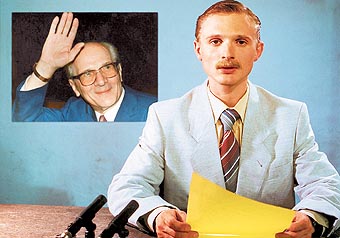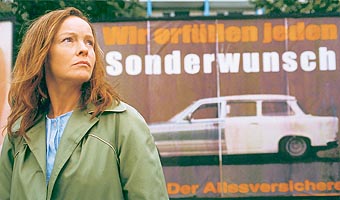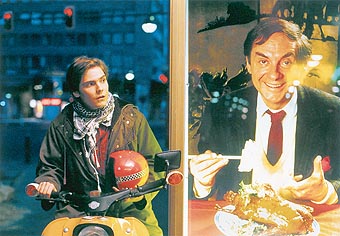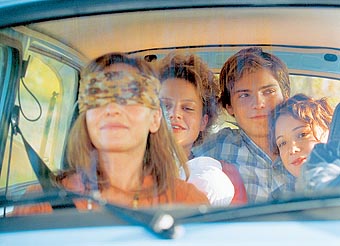 |
|||||||||||||||||
|
|||||||||||||||||
|
In English |
|
 |
Welcome Becker!
Kaltio 4/04 |
|
Becker seems tired. By the time of Sodankylä Midnight Sun Film Festival in June, Goodbye Lenin! has taken the director around the world for sixteen months. In addition, the arrival to Sodankylä had to be postponed with a day, due to an unexpected visit to the hospital, the festival's press secretary informs. Goodbye Lenin! is Wolfgang Becker's fifth feature length film. The director, born in 1954, has made haste slowly since his first long movie, Schmetterlinge, his final work in 1988 for the Deutsche Film- und Fernsehakademie in Berlin. Perhaps the early success raised the director's standards; his debut received the Oscar for the best student work, as well as the Golden Leopard at Locarno Film Festival. Sodankylä presented Becker's three latest works, Kinderspiele (1992), Das Leben ist eine Baustelle (1997) and Goodbye, Lenin!, which all discuss the survival of families under the pressures of society and family. The central themes are childhood and the meeting of a parent and a child, or rather the lack of this meeting. "In one film, you can only focus on mother or father", Becker says, "two hours is too short a time to examine thoroughly the child's relationship with both." Many people are surprised when they hear Becker is West German. The precise portrayal of the East culture is a result of hard work, and the director says he visited the East many times while living in Berlin in 1980s. The demolition of the Berlin Wall and the disappearance of the communist society form the background already to Becker's fourth film, Life Is All You Get, (Das Leben ist eine Baustelle, 1997). The middle-aged teddyboy Buddy, played by English Ricky Tomlinson, loses his apartment and the premises of his rock'n roll society as the Western companies and money roll into the East.
Primarily, Wolfgang Becker considers himself a storyteller. Furthermore, he says the success of Goodbye Lenin! comes from its universality. "Goodbye Lenin! is not a German story", Becker has said before. "It is not a film about reunification, it is a film about family and a strong relationship between a mother and a son, as well as the strange and crazy things the son does only to save his mother's life." In the film Alex Kerner's mother Catherine, an activist rewarded with the highest honour of the communist party, has a heart attack and falls into a coma right before the German reunification in the autumn of 1989. Against all odds, she wakes up from the coma the next summer. The doctor warns Alex and his sister not to let anything shock their mother. Alex decides to make her mother believe nothing has changed. Becker has mentioned the most interesting part in the making of Goodbye Lenin! having been the "news broadcasts" where DDR is supposedly still in its prime, filmed by Alex and his friends for Catherine. A Coca-Cola advert is explained by the beverage being actually of East German origin, and the presence of West Germans as a rush of people looking for a higher standard of living from the eastside of the Wall. The political environment in the story turns out to be unessential. The fact that Becker's production company X-Filme has already been asked about the remake rights of the film is another proof of this. Many people have wondered how the movie could be filmed somewhere else. 
Fiction is a means of commenting on the societal situation. But Goodbye Lenin!, like good art always does, has also affected 'true' reality: a primary school book that is published soon in Germany uses scenes from the film to depict the history of the reunification. One might expect a director who ponders the questions of truth and lies to question the use of fiction as the portrayer of historical reality. Becker is not concerned. 
Goodbye Lenin! catches the question of the truthfulness of historiography by paralleling archive material, post cards and original news footage with the fake news created by Alex and his friend Denis, who dreams of becoming a film director. Making an untruthful but still believable documentary is shown to be an easy process, but the viewer is also simultaneously invited to question the truthfulness of the original material. Who knows what will be examined as the official truth in fifty years? The tragedy has been left out of history books because the people who were killed belonged to the German community of New York. The anti-German atmosphere brought along by the First World War allowed the massive destruction be forgotten. It was in nobody's interest to hold up the memory of these victims – not even in that of German history writing. Even in the sphere of art and culture, similar social buoyancy is given consciously all the time. Certain things become impossible to change once they are hammered in the minds of people like with a chisel to a stone. Sometime it was decided somewhere that Mona Lisa was the most important painting ever painted. Paris is the tower of Eiffel, all Germans drink beer and eat sauerkraut. And of course everyone tries to control how people perceive the reality around them. Becker grins almost boyishly when he gets to talk about history. The director reminds us about the administrators always affecting what becomes the memory of humankind, and what is wiped out of that memory. Everyone should be alert when reading so-called official history. An example is the former chancellor Helmut Kohl who wanted to look like one of the most important politicians of the 20th century. Kohl's regime seems to have been corrupted and full of strange events. Material which could now prove who is telling the truth and who is lying does not exist anymore. The hard drives of the computers in the chancellor's house were erased as Kohl's party lost power. However, not even the ex-chancellor can silence the freedom of art to comment on faults in the society. The public funding of culture belongs to the states in Germany, not the central government; the country does not even have a minister of culture, only cultural secretaries for each of the sixteen states. Becker himself is from Nordrhein-Westphalen, where the social democrats who have held power for three decades have exercised liberal cultural policies.

The development of television moved people from theatres to their living rooms and forced the film industry to adjust into the new situation. The nature of films is changing again with the development of digital technology. It is almost impossible to find a copy of a new Hollywood film that has not been digitally processed. With Goodbye Lenin!, Becker had to rely on the help of computer graphics in a scene where Catherine, who is wondering the streets of Berlin half naked, comes across a helicopter that is transferring a statue of Lenin. Technology is most satisfying when you look at the result and do not notice it was made with a computer. No critics have mentioned technology as they speak of the statue scene; many have commented on its cinematic reference to the opening scene of Federico Fellini's La Dolce Vita. Becker still sees the future of the film bright and does not think digitalism will steal the bread of those who still create art with celluloid. However, revolution does not mean destroying what was there before. Precisely thanks to technology having become mundane and commonplace, music is everywhere around us.
|
|
